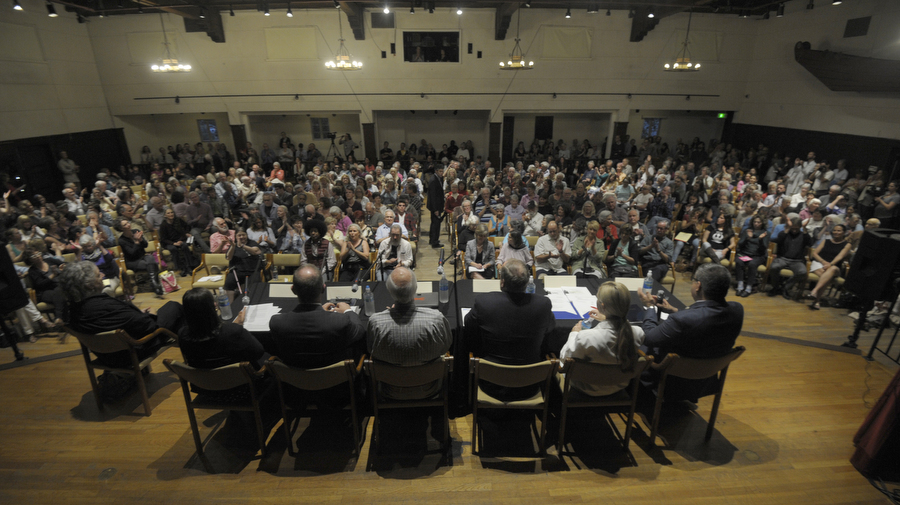S.B. Health-Care Experts Deliver Grim Trumpcare News
And Carbajal Drops Mic on Republican Repeal Bill
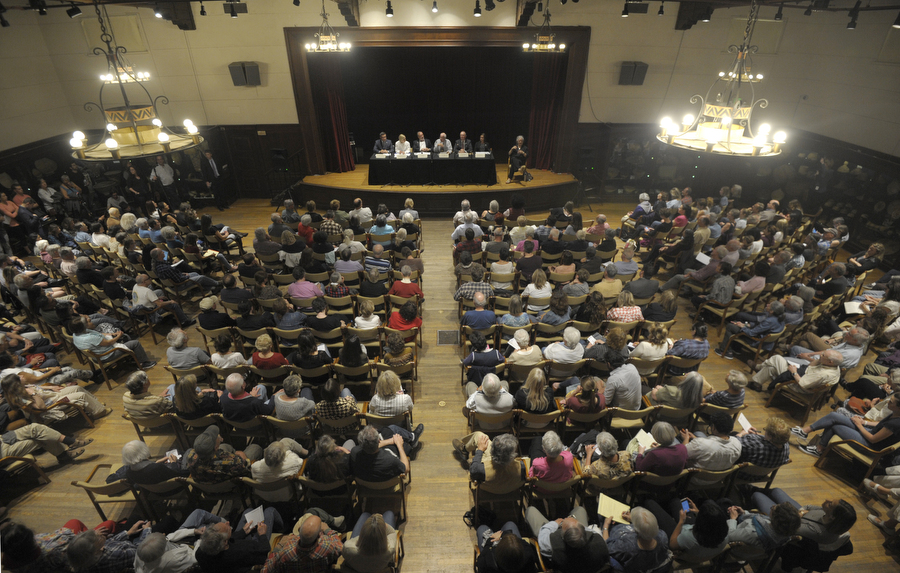
The timing couldn’t have been much better. Or worse.
The very day Santa Barbara’s Congressmember Salud Carbajal had scheduled a mic-dropping town hall forum to denounce the Republican bill to repeal the Affordable Care Act, the Congressional Budget Office (CBO) issued its intensely anticipated report on the same subject. The findings were extremely damning. In 10 years, 24 million fewer Americans would have health insurance if the Republicans’ American Health Care Act — now dubbed Trumpcare — were enacted than if Obamacare were allowed to run its course. In just year one, 14 million Americans would fall off the insurance rolls. By 2026, 52 million would be without, worse even than during the Great Recession when a record 48 million went uncovered.
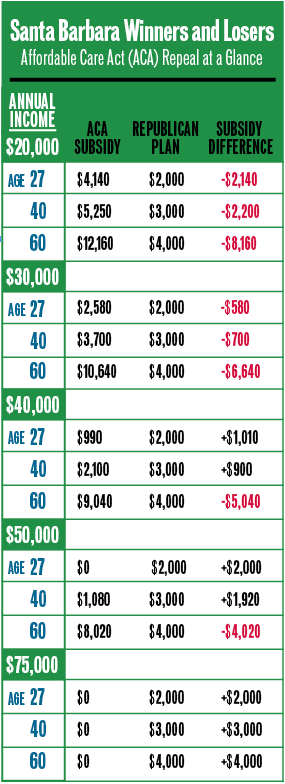
The fine print appeared even more devastating. The Republican plan, according to the CBO, would slash federal Medicaid spending by nearly a trillion dollars in 10 years, shedding from its roster nine million beneficiaries by 2020 and 14 million by 2026. Medicaid, part of President Lyndon Johnson’s War on Poverty, has traditionally funded health-care programs for the poorest of the poor — single women, their kids, and the elderly. Under the Affordable Care Act, Medicaid eligibility rules were expanded to allow low-income single adults to get covered. Income limits were likewise. Under Obamacare, someone earning as much as $16,400 a year — 138 percent the federal poverty level — could qualify. Before that, the cutoff was $12,000 a year.
The good news — at least to its Republican supporters — is that the CBO found the repeal bill would reduce federal spending by $377 billion over 10 years. It would have reduced it by even more, but the legislation includes about $800 billion in tax cuts. Those taxes — primarily on households earning more than $250,000 a year — had been imposed by the Affordable Care Act to pay for subsidies enacted to bring insurance premiums within financial reach for the 20 million customers who signed up over the past seven years. Under the Republican proposal, there will still be subsidies — tax rebates — but much less than under Obamacare. And according to the CBO, those Republican subsidies strongly favor the younger and the more affluent customers at the expense of older, low-income consumers.
Under Obamacare, subsidies were doled out based on income and geographic location. Under the repeal bill, subsidies — from $2,000-$4,000 — are parsed based on age instead. The Republicans took pains to maintain Obamacare’s protections for those with existing health-care conditions. But their bill allows insurance companies to compensate for the greater risk posed by older customers by charging them five times more than what they charge younger ones. Under Obamacare, the age differential charge was limited to three times.
Little wonder, then, that most of the 400-plus cramming into the Santa Barbara Museum of Natural History Monday night to attend Carbajal’s health-care town hall rant were sporting more than a dusting of snow at the temples. By then, the CBO report had been in general circulation several hours, and the disparate impact of the repeal bill on middle-income earners in their advanced middle ages was well known. Already, Facebook had blown up with the situation of a theoretical 64-year-old customer making $26,500 a year. Under Obamacare, this person could have secured a $15,000 health plan — with subsidies — for $1,700. Under the Republican plan, it would cost $14,600.
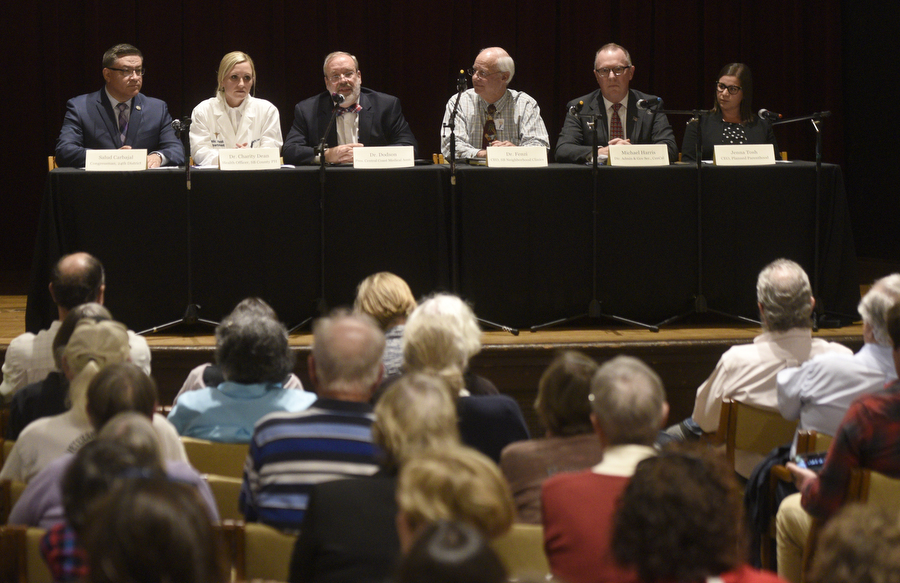
It was standing room only inside Fleischmann Auditorium, with the crowd pooling out into the courtyard. The enthusiasm was palpable and the clapping explosive enough to inflict eardrum discomfort. If anyone in attendance worried about Obamacare’s escalating premiums and long-term financial sustainability — or opposed the individual mandates so antithetical to the Republican virtue of economic choice — they kept such thoughts to themselves. Republican congressmembers in other districts have found themselves called on the carpet by large, spirited, angry anti-Trump crowds. But Carbajal, still finding his legs as an anti-Trump crusader, basked in unalloyed adulation. One member of the audience toasted him with a boisterous “Hip! Hip! Hooray!” Even Carbajal was taken briefly aback. “We didn’t set him up to do that,” he quipped.
As a firebrand, Carbajal didn’t pack much heat. He didn’t need to. He praised the crowd for its engagement. Keep writing letters and making phone calls, he told those assembled. The Republicans’ repeal bill, he said, was “ridiculous.” Mostly, he relied on the CBO report for talking points. “They’re basically trying to destroy our health-care system,” he charged, adding, “In other words, they want us to pay more for a lot less.” In his district, the percentage of the uninsured dropped from 16.5 to 9.4 under Obamacare.
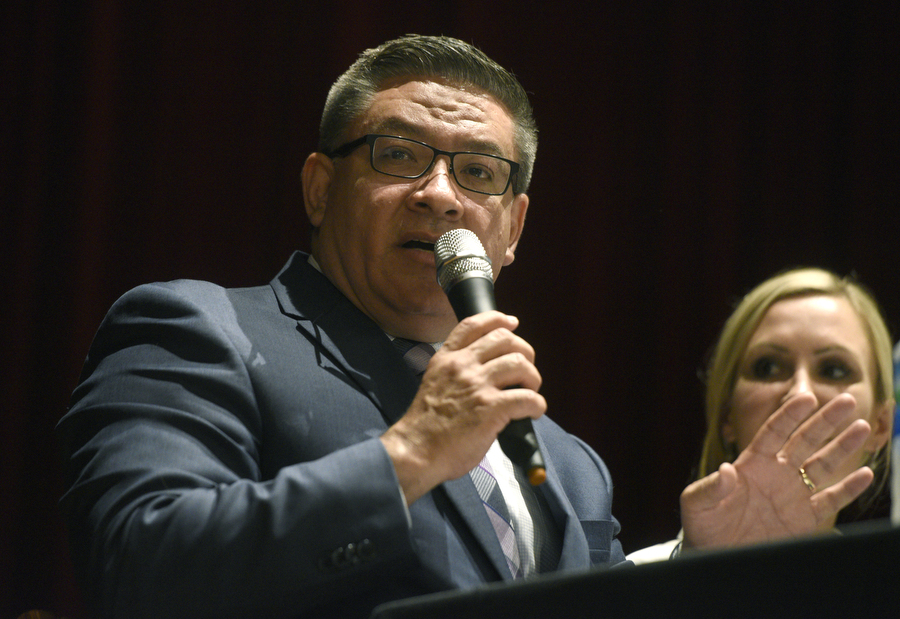
Carbajal let a heavyweight panel of area health-care experts do most of the talking. Together, they left few stones un-hurled when it came to the Republicans’ repeal legislation. Dr. Charity Dean, Santa Barbara County’s Public Health Officer, objected that the Republicans sought to eliminate outright Obamacare’s modestly funded Prevention and Public Health Fund. When four UCSB students turned up about four years ago with meningitis, an often deadly viral infection that frequently requires amputation of feet and hands, that fund covered the cost of 8,000 vaccines administered at UCSB for two years.
Likewise, Dean said, the same fund paid for the genetic detective work needed to link five cases of hepatitis C to a popular area medical practitioner offering an unorthodox blood transfusion-rejuvenation therapy. That’s nothing, however, compared to the massive question mark the repeal bill is casting over the 11,000 new patients enrolled at the eight Santa Barbara Health Clinics since Obamacare’s new Medicaid eligibility went into effect. Previously, Dean said, the county received $8 million in federal funds to treat the uninsured. Once insurance was provided — via the Affordable Care Act — that $8 million disappeared. But thus far, she said, she’s seen nothing in the repeal bill to suggest that $8 million is coming back.
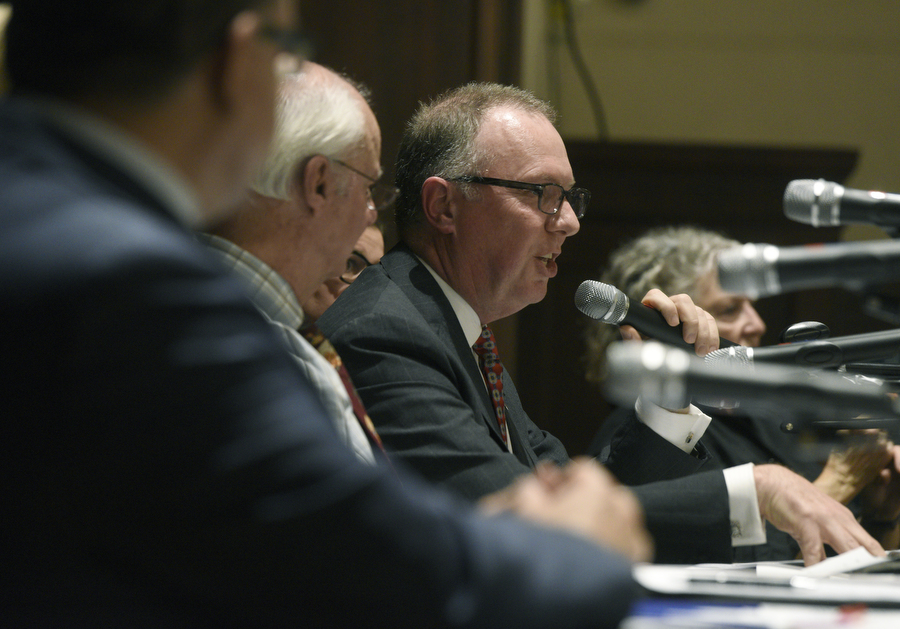
Dr. David Dodson, a general practitioner with Sansum Clinic and head of the Central Coast Medical Association, warned that the reforms wrought by the Republican repeal measure would trigger the very “death spiral” — fewer people getting insured, more getting sick, and the insurance carriers crumbling under the crushing financial unsustainability — that Republicans say they’re intent on preventing. Where Republicans argue consumers need more skin in the game to promote personal responsibility and foster competition — thus driving American health-care prices, $9,600 per capita, down — Dodson, a Canadian-born transplant from Massachusetts, insisted the real motivation is greed. “It’s the reverse Robin Hood thing that Republicans are addicted to,” he said. “It’s all that taking from the poor and giving to the rich.”
Less rhetorical, Dr. Charles Fenzi — CEO of Santa Barbara Neighborhood Clinics — reported that 16 percent of the clinics’ patients secured insurance through the Medicaid expansion. Before that, he said self-paying customers paid $30-$40 for medical encounters that cost the clinics $170 to provide. Now, the number of self-paying customers has dropped by 13 percent, and the clinics are reimbursed to the tune of $135 per encounter. The clinics provide safety-net care to some of the poorest families on the South Coast, and if those now on expanded Medicaid are pushed off, that will cost the clinics half a million a year. Fenzi took pains to praise the safety net provided by the area Planned Parenthood, which is slated to lose $10 million in Medicaid funding under the repeal. That’s out of a total budget of $15 million. Fenzi noted that the repeal bill provides $422 million nationally to clinics such as his, but he lamented that these supplemental funds are made available, in part, by the cuts to Planned Parenthood.
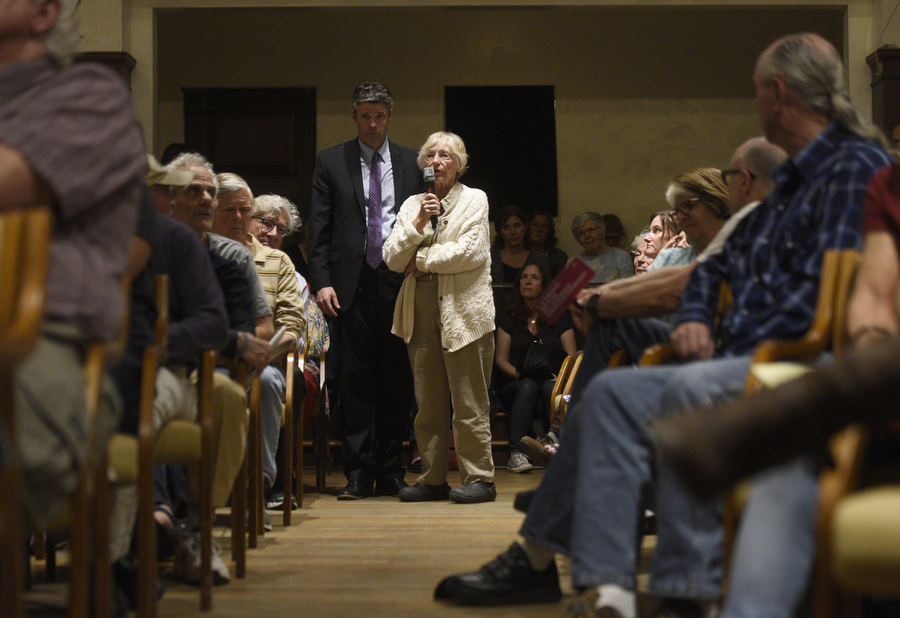
In Santa Barbara and San Luis Obispo counties, federal Medicaid dollars are administered by a public entity known as CenCal, which has seen its number of expanded eligibility enrollees swell by 46,000, 30,000 of whom live in Santa Barbara. Since January 2014, these patients have now received $436 million. That’s a big genie to try to stuff back in the bottle should the repeal bill pass and expanded eligibility enrollments be stopped, effective 2020. Statewide, one out of every two births is covered by Medicaid as are one out of every three residents. In Santa Barbara, the numbers are only slightly less striking: one out of every four. Statewide, expanded Medicaid translates to 3.7 million newly covered patients. Covered California, by contrast, accounts for 1.2 million.
Many in the audience wanted to know what more they could do. Several alluded to mass protests against the Vietnam War, suggesting that the Trump agenda required sterner measures than mere letters and phone calls. One drew big laughs joking that he’d be willing to swap his iPhone for a health insurance policy any day, riffing on Utah Republican Representative Jason Chaffetz’s admonition against buying the former instead of investing in the latter.
Many pressed Carbajal whether the time was ripe to press for a single-payer insurance program. He was supportive but noncommittal. Others questioned why the Democrats weren’t more aggressive. One nurse demanded why Democrats hadn’t figured out how to use social media to “suck the oxygen back into the room.”
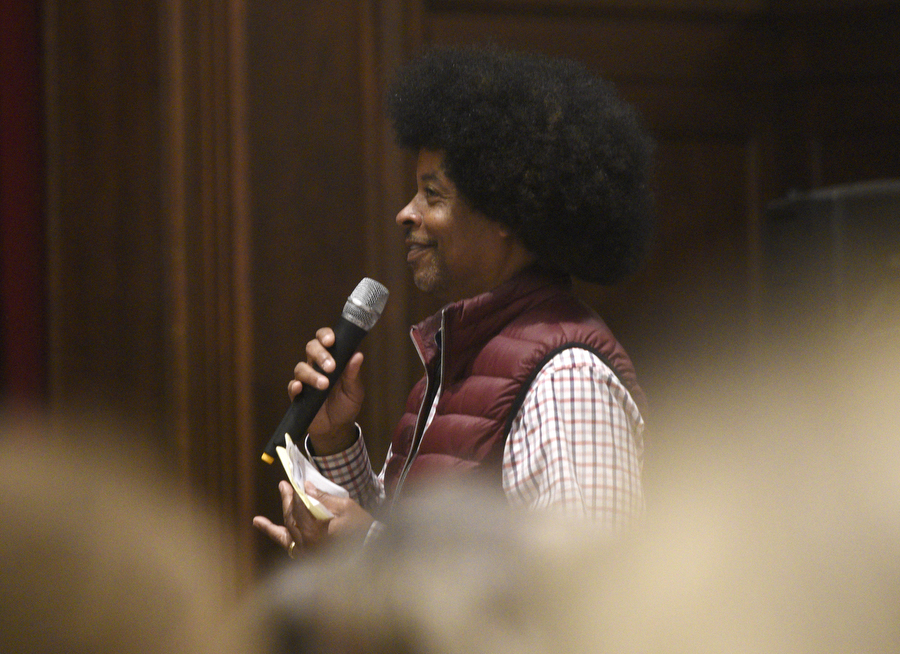
Many nurses and medical professionals spoke. One, a 72-year-old retired nurse, explained she found herself on the precipice financially and medically. “The thing that never would happen to me has happened to me,” she said. “Most of us are people that used to be in the middle class, not just a bunch of bums.” Where, she wondered, could she go to still get care if the repeal passed? Charles Fenzi of the Neighborhood Clinics answered, “We, for one, plan to be around no matter how we’re getting funded. It’s just getting harder to do so.”
Response to the CBO report has been explosive and all over the map. Republican House leader Paul Ryan said the numbers prove the repeal plan has bad teeth. Conservative Republicans remain unconvinced, referring to the plan as “Obamacare Lite.” Moderate Republicans—many representing districts with large numbers the low-income middle-aged people the bill punishes—are running for cover. Trump has denounced both the CBO report and the CBO itself as tainted and untrustworthy.
Later this week, the bill goes to the House Budget Committee on which Carbajal sits. Democrats will try to slow it down with amendments, Carbajal said, but the votes aren’t there to stop it. That’s why, he said, town hall forums like Monday’s matter. Or as Jenna Tosh, CEO of Planned Parenthood and one of the health-care panelists, put it, “There’s one reason why this bill hasn’t passed; it’s because of what’s happening in this room tonight.”
